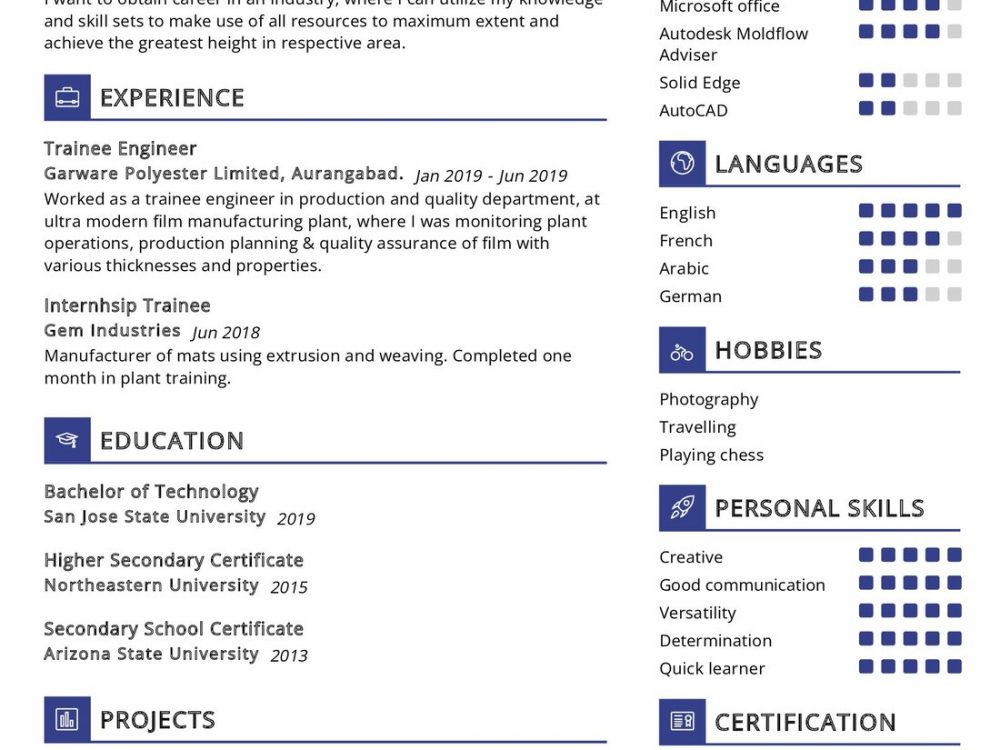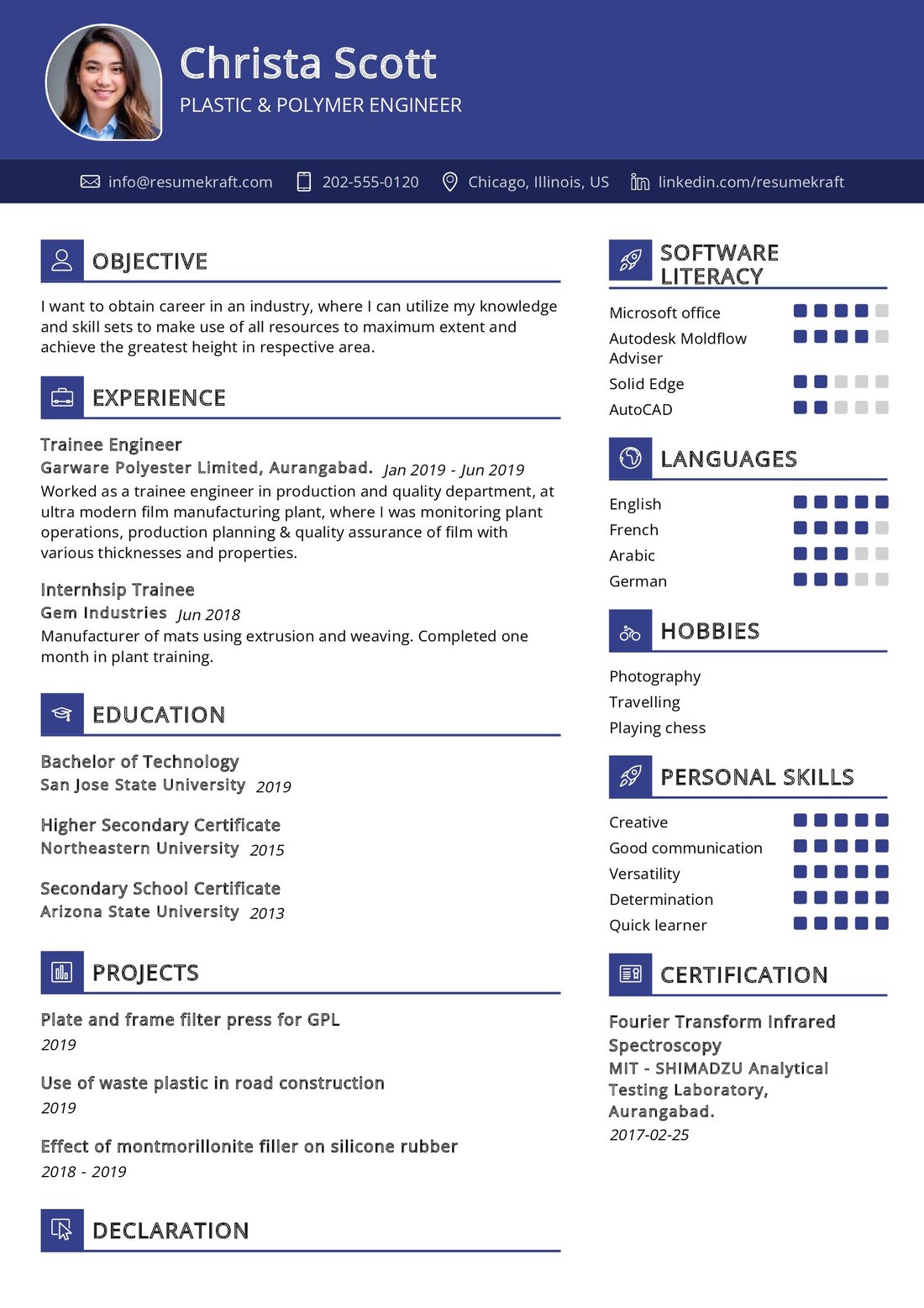Plastic & Polymer Engineer: Shaping Tomorrow’s Innovations
As industries continue to advance, the role of a Plastic & Polymer Engineer has become increasingly vital in the ever-evolving landscape of materials science. This position demands a unique blend of technical expertise and creative problem-solving skills to contribute to the development and enhancement of various products and processes. Let’s explore the multifaceted role of a Plastic & Polymer Engineer, a profession that bridges the gap between science and innovation.
What is the Role of a Plastic & Polymer Engineer?
The role of a Plastic & Polymer Engineer is dynamic, involving the design, development, and optimization of plastic and polymer materials for a wide range of applications. These professionals work across industries, from manufacturing and automotive to healthcare and consumer goods, contributing to the creation of durable, efficient, and sustainable products.
A Plastic & Polymer Engineer is responsible for:
- Researching and developing new plastic and polymer materials with enhanced properties.
- Designing manufacturing processes for the production of plastic components.
- Collaborating with cross-functional teams to ensure the successful integration of plastic materials into products.
- Conducting tests and analyses to assess the performance and quality of plastic and polymer materials.
- Staying abreast of industry trends and advancements in polymer science to drive innovation.
- Ensuring compliance with industry standards and regulations related to plastic materials.
It’s a role that requires a deep understanding of material science, engineering principles, and a keen eye for innovation.
Plastic & Polymer Engineer Job Requirements
Becoming a Plastic & Polymer Engineer involves meeting specific educational and skill requirements. Let’s delve into the qualifications and expertise needed to embark on this exciting career path:
- A Bachelor’s or Master’s degree in Chemical Engineering, Polymer Science, or a related field, providing a strong foundation in material science and engineering principles.
- In-depth knowledge of polymer chemistry, material properties, and processing techniques.
- Experience in the practical application of plastic materials in manufacturing processes.
- Proficiency in using simulation tools and software for the analysis and design of polymer structures.
- Strong problem-solving skills and the ability to innovate in the development of new materials.
- Effective communication skills to collaborate with diverse teams and convey technical information to non-technical stakeholders.
- Adaptability and a continuous learning mindset to stay updated with advancements in polymer science and engineering.
Obtaining additional certifications in specific polymer technologies can significantly enhance your profile in the competitive job market.
Responsibilities of a Plastic & Polymer Engineer
The responsibilities of a Plastic & Polymer Engineer are varied and impactful, contributing to the success of projects and the advancement of technology. Let’s unravel the core duties that define this role:
- Conducting research to develop new polymer formulations with improved mechanical, thermal, and chemical properties.
- Designing and optimizing manufacturing processes for the production of plastic components, considering efficiency and cost-effectiveness.
- Collaborating with design and production teams to ensure the successful integration of plastic materials into the final product.
- Performing tests and analyses on plastic materials to assess their performance, durability, and safety.
- Providing technical expertise and guidance to teams involved in product development and manufacturing.
- Staying informed about the latest developments in polymer science and technology to drive innovation within the organization.
- Ensuring compliance with industry standards and regulations related to plastic materials and manufacturing processes.
Each responsibility comes with its own set of challenges and learning opportunities, shaping you into a skilled Plastic & Polymer Engineer.
Plastic & Polymer Engineer Resume Writing Tips
Crafting a compelling resume is essential to stand out in the competitive job market. Here are some tips to help you create a resume that highlights your expertise and showcases your potential as a Plastic & Polymer Engineer:
- Emphasize specific projects where you’ve successfully developed or improved plastic materials.
- Showcase your hands-on experience with different polymer processing techniques.
- Highlight instances where you’ve collaborated with cross-functional teams to bring innovative products to market.
- Quantify your achievements, such as percentage improvements in material properties or cost savings in manufacturing processes.
- List relevant certifications and training programs, demonstrating your commitment to ongoing professional development.
- Customize your resume for each application, aligning your skills and experiences with the specific requirements of the job.
Your resume is a reflection of your journey as a Plastic & Polymer Engineer, so make it compelling and tailored to showcase your unique strengths.
Plastic & Polymer Engineer Resume Summary Examples
Your resume summary serves as a snapshot of your career, offering a glimpse into your skills and accomplishments. Here are some examples to inspire your resume summary:
- “Results-driven Plastic & Polymer Engineer with a proven track record in developing high-performance polymer formulations, contributing to a 15% increase in product durability.”
- “Experienced Polymer Engineer specializing in cost-effective manufacturing processes, adept at optimizing production efficiency and reducing material waste.”
- “Innovative Plastic Engineer with a passion for sustainability, leading projects that incorporate eco-friendly polymer materials into product design and manufacturing.”
Each summary is an opportunity to showcase your unique strengths and make a memorable impression on potential employers.
Create a Strong Experience Section for Your Plastic & Polymer Engineer Resume
Your experience section is the heart of your resume, where you detail the impactful projects and achievements that have defined your career. Here are some examples to guide you:
- “Led a cross-functional team in developing a new polymer formulation, resulting in a 20% improvement in product longevity and customer satisfaction.”
- “Optimized injection molding processes, reducing production costs by 15% while maintaining product quality standards.”
- “Collaborated with design engineers to introduce a lightweight yet durable plastic component, contributing to a 10% reduction in overall product weight.”
Each experience is a testament to your expertise and the positive impact you’ve had on projects and teams throughout your career.
Education Section for Your Plastic & Polymer Engineer Resume
Your educational background is a crucial aspect of your resume, showcasing the foundation of your knowledge and skills. Here’s how you can present your educational milestones:
- Master of Science in Chemical Engineering, XYZ University, a comprehensive program focusing on polymer science and materials engineering, 2017.
- Bachelor of Science in Polymer Science and Engineering, ABC University, the cornerstone of your academic journey into the world of plastics, 2015.
- Certified Polymer Technologist, Polymer Engineering Institute, a recognized qualification showcasing your specialized knowledge in polymer technology, 2018.
Each educational qualification is a building block in your journey towards becoming a proficient Plastic & Polymer Engineer.
Plastic & Polymer Engineer Skills for Your Resume
Your skill set is your toolkit, equipped with a diverse range of abilities that make you a valuable asset in the field of Plastic & Polymer Engineering. Let’s list down the essential skills for a Plastic & Polymer Engineer:
Technical Skills:
- Expertise in polymer chemistry, with a deep understanding of material properties and structure.
- Proficiency in using simulation tools and software for the analysis and design of polymer structures.
- Hands-on experience with polymer processing techniques, including injection molding, extrusion, and blow molding.
- Familiarity with industry standards and regulations related to plastic materials and manufacturing processes.
- Knowledge of sustainable and eco-friendly polymer materials, with a focus on environmental impact.
Soft Skills:
- Effective communication skills for collaboration with cross-functional teams and conveying technical information to non-technical stakeholders.
- Problem-solving abilities, with a knack for finding innovative solutions in the development and optimization of plastic materials.
- Attention to detail, ensuring precision in material testing and analysis.
- Adaptability and a continuous learning mindset to stay updated with advancements in polymer science and technology.
- Project management skills, essential for overseeing the development and implementation of plastic materials in various applications.
Each skill is a tool, contributing to your ability to excel in the dynamic field of Plastic & Polymer Engineering.
Common Mistakes to Avoid When Writing a Plastic & Polymer Engineer Resume
Avoiding common resume pitfalls is crucial to creating a standout application. Here are some mistakes to steer clear of:
- Avoid using generic language; tailor your resume to highlight your unique contributions and experiences as a Plastic & Polymer Engineer.
- Don’t merely list job duties; showcase your achievements and the impact you’ve had on projects and processes.
- Include a well-crafted cover letter to provide additional context and showcase your passion for Plastic & Polymer Engineering.
- Avoid excessive technical jargon; ensure your resume is accessible to both technical and non-technical readers.
- Thoroughly proofread your resume to maintain a professional image and avoid any typos or errors.
Avoiding these mistakes will help you create a resume that effectively communicates your value as a Plastic & Polymer Engineer.
Key Takeaways for Your Plastic & Polymer Engineer Resume
As we conclude this comprehensive guide, let’s recap the key points to consider when crafting your Plastic & Polymer Engineer resume:
- Highlight specific projects and achievements to demonstrate your impact as a Plastic & Polymer Engineer.
- Emphasize your hands-on experience with different polymer processing techniques and the successful integration of plastic materials into products.
- Quantify your achievements with percentages and metrics to provide concrete evidence of your contributions.
- List relevant certifications and training programs to showcase your commitment to continuous learning and professional development.
Finally, feel free to utilize resources like AI Resume Builder, Resume Design, Resume Samples, Resume Examples, Resume Skills, Resume Help, Resume Synonyms, and Job Responsibilities to create a standout application and prepare for the Plastic & Polymer Engineer job interview questions.
Armed with these insights and tips, you are now ready to craft a resume that is a true reflection of your journey, your skills, and your aspirations. Remember, your resume is not just a document; it is a canvas where you paint your career story, a story of growth, learning, and innovation. Best of luck!


